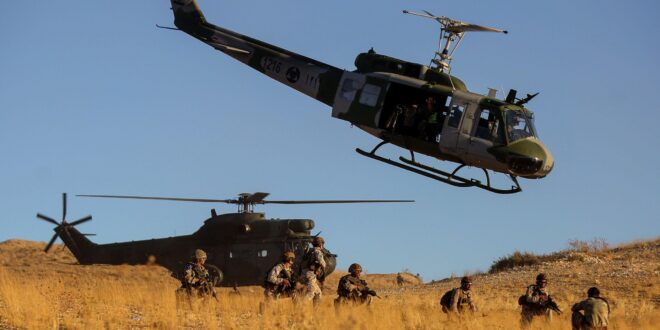Explainer: As Israel bombards Beirut, we take a look at Britain’s military role in Lebanon.
In his first public speech as chief of MI6 in 2021, Sir Richard Moore said his intelligence agency was “actively focused on Iran”.
This was part of what he described as a “dramatic change in the security landscape” in which there was “a growing threat from state actors”.
But alongside Iran, Russia and China as the UK’s demons, he also identified Iran-backed Hezbollah as “a state within a state, contributing directly to state weakness and political turmoil in Lebanon”.
Countering Hezbollah has long preoccupied British planners. The UK has for years pumped money into the Lebanese military to build it up as an alternative national security force to its Iran-backed rival.
Labour ministers, who backed Israel’s assault on Gaza, are now urgently calling for a ceasefire amid the invasion of Lebanon, which could spark a still wider conflagration.
The UK government dispatched 700 troops to Cyprus, ostensibly to prepare for an evacuation of around 10,000 British nationals in Lebanon, with the SAS apparently already on the ground.
Yet Britain’s military was in Lebanon years before Israel’s invasion. So what’s it been doing there, and why?
Alternative to Hezbollah
Lebanon has long been teetering on the brink. The main fear of Anglo-American planners has been that Lebanon’s political and economic crisis will translate into ever-increasing influence for Hezbollah and tilt the country even more towards Iran.
Western planners have similar considerations in another ‘buffer’ state, Ukraine, in which Nato sees Russia as a rival for control over the territory and the wider region.
To retain Lebanon in the Anglosphere, the British and American militaries have long cultivated the Lebanese Armed Forces (LAF), seeing it as “a national representative institution to provide an alternative to Lebanese Hezbollah”, as a senior US official said in 2021.
Labour’s new foreign minister Hamish Falconer recently put it just as clearly. He told parliament: “Our assessment remains that a strong, sovereign Lebanon with strong state institutions, including the Lebanese Armed Forces, is the best way to tackle Hizballah’s [sic] influence in Lebanon”.
Hezbollah draws its support from the country’s Shia Muslims, who comprise around 30% of the population. The rest of Lebanon is mainly Sunni Muslim or Maronite Christian, with the LAF meant to be a national, multi-communal security agency, capable of playing a balancing act in political crises.
To Washington and London, however, it’s more that the LAF are an obvious force through which to exert their influence, to counter Iran’s Shia theocracy and its proxy force in Lebanon.
The US has poured $3bn in military aid into the LAF since 2006 and trained thousands of its troops, to provide that counterweight to Hezbollah.
The LAF is led by General Joseph Aoun, himself a US-trained soldier who visited America in June for talks with Pentagon officials and is tipped to be a future president of Lebanon.
 Eurasia Press & News
Eurasia Press & News



